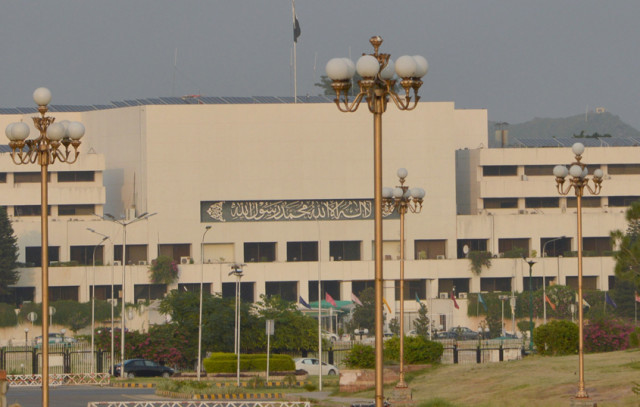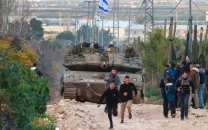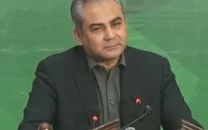NSC convenes today to ponder regional scenario
Islamabad condemns US strikes on Iran; Shehbaz speaks with Pezeshkian

Pakistan's civil and military leadership will meet in an emergency huddle on Monday (today) to discuss the United States strikes on Iran in a watershed development that has put the world on an uncharted path with far-reaching consequences.
Islamabad was quick to condemn the US strikes as clear violation of international law and UN Charter while vehemently dismissed reports of any complicity in the attack. Officials said neither Pakistan's airspace nor any other facility was used by the US to conduct highly controversial strikes.
Prime Minister Shehbaz Sharif also spoke to the Iranian President and reiterated Pakistan's condemnation of the US strikes on three nuclear sites of Iran. Shehbaz will also preside over the meeting of the high-powered National Security Committee (NSC).
The NSC meeting – to be attended by senior cabinet members and military and intelligence chiefs — will take stock of the situation. The primary agenda on the table will be how to evolve the country's strategy against the backdrop of brewing crisis.
Sources said on Sunday that Pakistan's stance was unambiguous even when Israel launched strikes on Iran about a forthright ago. Pakistan was against such unprovoked and reckless action by Israel, according to sources.
It was because of this reason Pakistan was at the forefront in condemning the Israeli strikes and extended full diplomatic support to Iran. Islamabad took a clear stance at the United Nations Security Council (UNSC), denouncing Israel and saying that Iran reserved the right to respond.
There was no difference in the Pakistani stance when the US conducted unprecedented strikes on Iranian nuclear sites. Pakistan faced a difficult situation as only a day ago it formally nominated US President Donald Trump for Noble Prize for his role in brokering ceasefire between India and Pakistan.
The sources said that Pakistan's move was aimed at encouraging Trump to pursue diplomacy over the use of force. That gamble, however, did not pay off. Nevertheless, this did not deter the Foreign Office from issuing a strong statement against the United States.
"Pakistan condemns the US attacks on Iranian nuclear facilities which follow the series of attacks by Israel. We are gravely concerned at the possible further escalation of tensions in the region," read the Foreign Office statement.
"We reiterate that these attacks violate all norms of international law and that Iran has the legitimate right to defend itself under the UN Charter," it, said, adding that the unprecedented escalation of tension and violence, owing to ongoing aggression against Iran was deeply disturbing.
"Any further escalation of tensions will have severely damaging implications for the region and beyond. We emphasise the imperative need to respect civilian lives and properties and immediately bring the conflict to end."
The Foreign Office stressed that all parties must adhere to international law, particularly the international humanitarian law. According to the statement, recourse to dialogue, diplomacy, in line with the principles of the UN Charter, remained only viable pathway to resolve the crises in the region.
Separately, Prime Minister Shehbaz held a detailed telephone conversation with Iranian President Masoud Pezeshkian and conveyed Pakistan's condemnation of the U attacks, which followed Israel's unprovoked and unjustified aggression over the past eight days.
Prime Minister Shehbaz reaffirmed Pakistan's "unwavering solidarity" with the brotherly people and the government of Iran, while expressing heartfelt condolences on the loss of precious lives and prayed for the swift recovery of the injured.
The prime minister expressed concerns that the US strikes had targeted facilities that were under the safeguards of the International Atomic Energy Agency (IAEA). These attacks constituted a serious violation of international law and the IAEA statute.
While noting Iran's right to self-defence, as enshrined under Article 51 of the UN Charter, Shehbaz stressed the need for an immediate return to dialogue and diplomacy. He also called for urgent collective efforts to de-escalate the situation.
The Prime Minister reiterated Pakistan's readiness to play a constructive role in this context. Pezeshkian appreciated Pakistan's support to Iran and thanked the prime minister, the government and the people of Pakistan, including the military leadership, for standing in solidarity with Iran.
The two leaders emphasised the need and urgency of forging unity among the Ummah at this critical juncture. The two leaders agreed to remain in close contact.




















COMMENTS
Comments are moderated and generally will be posted if they are on-topic and not abusive.
For more information, please see our Comments FAQ